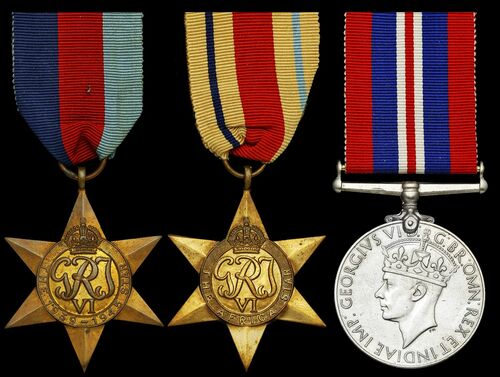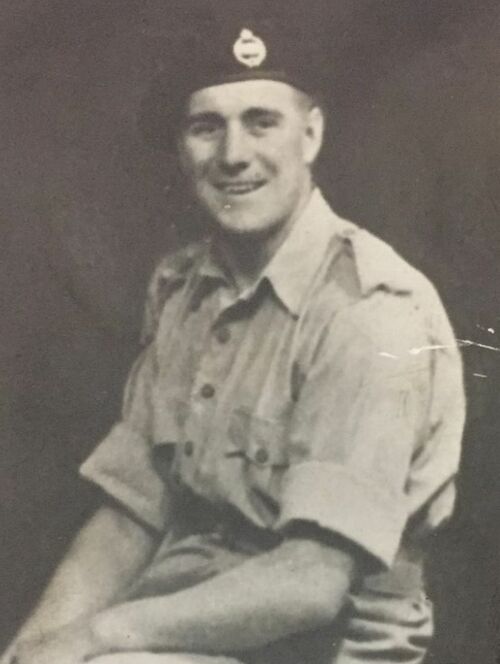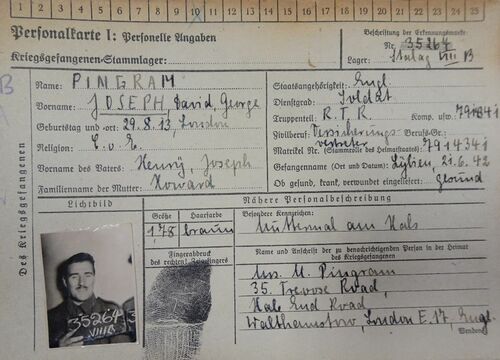Auction: 23002 - Orders, Decorations and Medals
Lot: 56
'Monday, 16 June 1941:
HELL DAY - attack continuing - bombed in the afternoon; 2 chaps killed and 3 wounded on our carrier. Camp between the enemy and our fire. Had to evacuate, moving all night…'
So states the diary of Trooper Joseph Pingram, 7th Battalion, Royal Tank Regiment.
A well-documented Second World War P.O.W.'s campaign group of three awarded to Trooper J. D. G. Pingram, 7th Battalion, Royal Tank Regiment (R.A.C.), who was captured at Gazala in June 1942
1939-45 Star; Africa Star; War Medal 1939-45, good very fine (3)
Joseph David George Pingram was born in London on 29 August 1913. As evidenced by accompanying documentation, he was a talented amateur heavyweight boxer throughout the 1930s, fighting bouts at venues such as Alexandra Palace; he continued his boxing career in the army, befriending the Scottish heavyweight champion Bob Scally and fighting bouts in Cairo and elsewhere.
Having enlisted in July 1940, he was embarked for North Africa as a member of 7th Royal Tank Regiment (R.T.R.), a component of 4th Armoured Brigade, and quickly saw action in Operation "Battleaxe" in mid-June 1941, the failed attempt to raise the siege of Tobruk. Pingram and his comrades fought valiant close-range actions over three days, not least at Fort Capuzzo, but their Matilda II tanks proved vulnerable to enemy 88mm fire. In fact, 4th Armoured Brigade had a total of 220 tanks knocked-out during "Battleaxe."
V.C. action: 7th R.T.R. at Gazala
7th R.T.R. subsequently participated in the ill-fated "Crusader" operation of November 1941, but it was in the protracted and costly battle of Gazala in May - June 1942 that Pingram was taken P.O.W., a fate that befell all of his comrades, or at least those who survived. An indication of the ferocity of those engagements is to be found in the award of the Victoria Cross to his Commanding Officer, Lieutenant-Colonel H. R. B. Foote, D.S.O., not least in his grim determination to permit the withdrawal of the Guards Brigade from the jaws of Rommel's offensive. His tank was hit 29 times and, when his communications and guns had all been destroyed, he led what was left of his regiment forward on foot using hand signals to guide them, an example of physical courage and leadership, in desperate circumstances, which to those that witnessed it, defied adequate description.
Of subsequent events, a website dedicated to the 4th and 7th R.T.R. states: 'Under intense pressure the 4th and 7th pulled back into defensive positions in the Tobruk enclave taking over the battle-worthy tanks and some crews from the remnants of 1st, 8th and 42 R.T.R. Thus, by 18 June the 4th and 7th were inside the enclave once again. Instead of pursuing the Eighth Army eastwards Rommel turned to attack Tobruk.
Around the Tobruk perimeter mines had been lifted and used in the Gazala Line. They had not been replaced nor the defences refurbished; General Klopper and his South African Division had had that responsibility. By 0830 hours on 20 June 1942, Afrika Korps tanks and infantry were pouring through the breach.
Rommel was forward with the leading troops and had marshalled one hundred tanks. The 4th and the 7th were ordered to counter-attack and an intensive battle raged for over eight hours. They had made the attackers pay a heavy price but eventually the Fourth and the Seventh ceased to exist as cohesive units.
At dawn on 21 June 1942, General Klopper surrendered the garrison. There were isolated cases of tanks and infantry continuing to fight, including three tanks that were still fighting near the beach 48 hours later. The Fourth and the Seventh, who had fought together very many times since 1917 went down fighting side by side and the survivors went into captivity together.
Both Regiments had suffered terminal losses of fighting vehicles and crews. All officers and men were either wounded, captured or dead. The latter lie in the Tobruk Cemetery.'
Pingram was among the survivors, initially being interned in Italy - in P.G. 53 at Lucca and P.G. 53 at Macurata - prior to being removed to Stalag 344 at Lamsdorf, from whence he was employed at a working camp. Liberated in May 1945, he was transferred to the Army Reserve in January 1946.
Sold with a large quantity of original documentation, including the recipient's diaries for 1941 and 1944, and another part-diary for 1943, in a memorandum book, including significant commentary on North African actions and his time as a P.O.W.; his Soldier's Release Book, Class 'A', together with his certificate of transfer to the Army Reserve, and assorted correspondence, newspaper cuttings and much besides, with documentation relating to his boxing career.
Subject to 20% VAT on Buyer’s Premium. For more information please view Terms and Conditions for Buyers.
Sold for
£270
Starting price
£160









